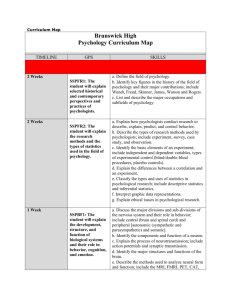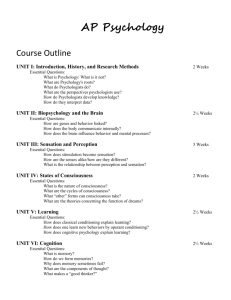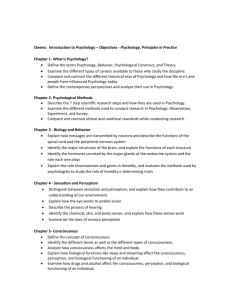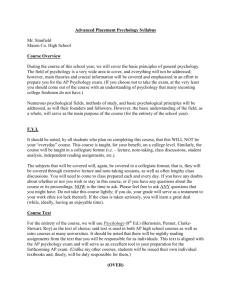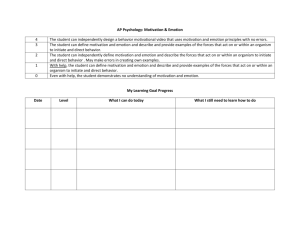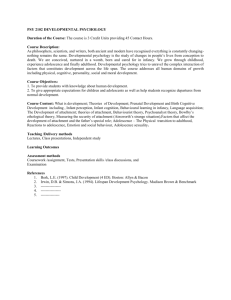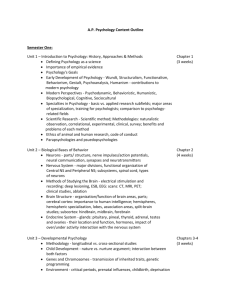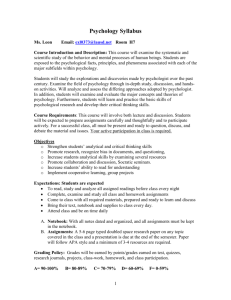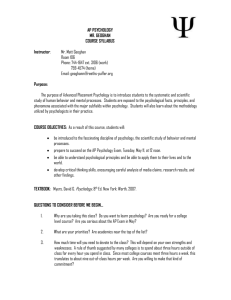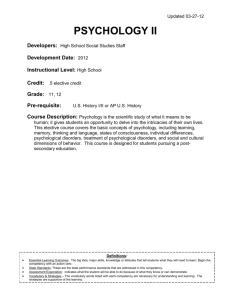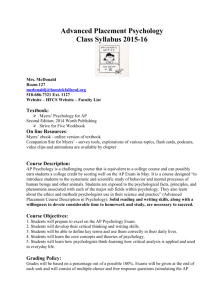PSY 1010 General Psychology SS
advertisement
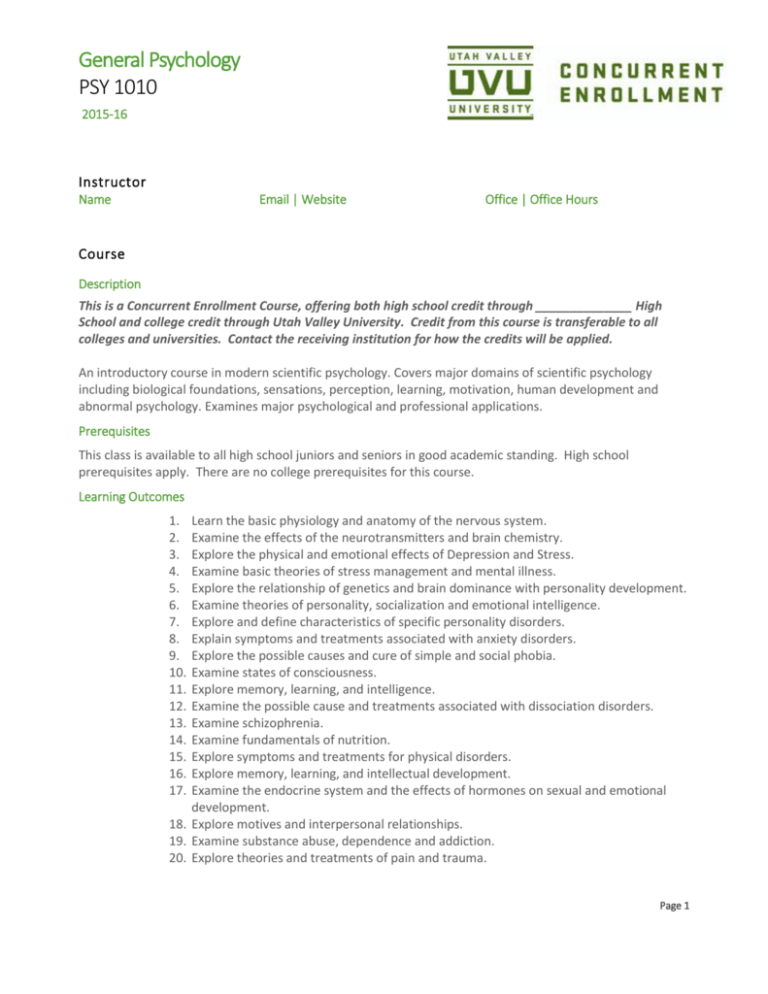
General Psychology PSY 1010 2015-16 Instructor Name Email | Website Office | Office Hours Course Description This is a Concurrent Enrollment Course, offering both high school credit through ______________ High School and college credit through Utah Valley University. Credit from this course is transferable to all colleges and universities. Contact the receiving institution for how the credits will be applied. An introductory course in modern scientific psychology. Covers major domains of scientific psychology including biological foundations, sensations, perception, learning, motivation, human development and abnormal psychology. Examines major psychological and professional applications. Prerequisites This class is available to all high school juniors and seniors in good academic standing. High school prerequisites apply. There are no college prerequisites for this course. Learning Outcomes 1. 2. 3. 4. 5. 6. 7. 8. 9. 10. 11. 12. 13. 14. 15. 16. 17. Learn the basic physiology and anatomy of the nervous system. Examine the effects of the neurotransmitters and brain chemistry. Explore the physical and emotional effects of Depression and Stress. Examine basic theories of stress management and mental illness. Explore the relationship of genetics and brain dominance with personality development. Examine theories of personality, socialization and emotional intelligence. Explore and define characteristics of specific personality disorders. Explain symptoms and treatments associated with anxiety disorders. Explore the possible causes and cure of simple and social phobia. Examine states of consciousness. Explore memory, learning, and intelligence. Examine the possible cause and treatments associated with dissociation disorders. Examine schizophrenia. Examine fundamentals of nutrition. Explore symptoms and treatments for physical disorders. Explore memory, learning, and intellectual development. Examine the endocrine system and the effects of hormones on sexual and emotional development. 18. Explore motives and interpersonal relationships. 19. Examine substance abuse, dependence and addiction. 20. Explore theories and treatments of pain and trauma. Page 1 Text | Instructional Material Psychology Concepts and Applications by Jeffery S. Nevid, Hougton Mifflin Company, Boston/New York Psychology Eighth Edition in Modules by David G. Myers, Worth Publishers. This course will be structured around lectures by the instructor. Student Participation is strongly encouraged. To complete this course successfully students should come to class regularly, pay attention and take notes, read the book, ask questions, and study. Course Topics Introduction to Psychology and Methods of Research Foundations psychology, who and what are psychologist, research methods, critical thinking. Biological Foundations of Behavior Neurons, peripheral nervous system, central nervous system, the brain, endocrine system, nature/nurture, biofeedback. Sensation and Perception Basic concepts of sensation, vision, hearing, other senses, perception, psychology and pain management. Consciousness States of consciousness, sleeping and dreaming, meditation, hypnosis, drugs. Learning Classical conditioning, the immune system, operant conditioning, escape, avoidance, punishment, cognitive learning, insight, latent learning, observational learning. Memory Remembering, forgetting, biology of memory, improving memory. Thinking, Language, and Intelligence Thinking, language, intelligence, problem solving. Motivation and Emotion Motivation, biological, psychological, hunger, obesity, eating disorders, emotions, expression, brain structures, love, emotional intelligence, anger management. Child Development Nature/nurture, continuity/discontinuity, universality question, stability question, prenatal development, infant development, emotional and social development, cognitive development. Adolescence and Adulthood Adolescence, early and middle adulthood, late adulthood, death and dying, living longer, exercise, nutrition, weight management, stress management, general health and wellness. Gender and Sexuality Gender Identity and rolls, psychological and physiological attraction, relationships, communication. Personality Psychodynamic perspective, trait perspective, social-cognitive perspective, humanistic perspective, personality test, self esteem. 2 Psychological Disorders Abnormal behavior, anxiety disorders, dissociative and somatoform disorders, mood disorders, Schizophrenia, personality disorders. Methods of Therapy History of therapy, psychotherapy, biomedical therapy. Social Psychology Perceiving others, relating to others, prejudice, aggression, group influences, conformity, authority, social facilitation, mob behavior, decision making, individual behavior. Psychology and Health Stress, body’s response to stress, the immune system, psychological and physical illness, heart disease, cancer, other disorders, stress management. Assessment 1. Assignments: Worksheets and assignments will be given each class period. Test questions will come from the assignments and test. Assignments will be posted, my.uen.org/202151, the day after the lecture. 2. Service Project: This is a service type of project designed for you to help someone in need. Your project can be any service that will help in someone’s life. This project should be something that you are not currently involved with. After the project is completed you will be required to write a 2-3 page paper on your activities, what specific things you did, and how the project impacted the other persons live as well as your own. 3. Individual Project: “Who am I and how did I get to be that person?” Each student will provide photographs of themselves at the four stages of development: infancy, childhood, adolescence, and young adulthood. Each photograph must also show or be accompanied by a brief description of the major socializing agents in their lives at that stage. The students will write a brief essay describing their childhood and adolescence. The essay will include defining who the students were at that stage who they have become. The students will also identify the socializing agents of each stage and how this influenced the students’ development. 4. Tests: Questions will come from the assignments and text. Six (6) to nine (9) 100 point examinations will be given each semester. Exams will be case histories, multiple choice, true/false, and matching. Exam dates and review topics will be posted, my.uen.org/202151. Tests must be made up before the Final. There will be no make up for the Final. Department Grading Scale A = 100-93 A - = 92-90 B+ = 89-87 B = 86-83 B - = 82-80 C+ = 79-77 C = 76-73 C - = 72-70 D+ = 69-67 D = 66-63 D - = 62-60 F = 59-0 Page 3 Grades and Credit You will receive the same grade for your high school course as you receive for your college course. Your grade for this class will become part of your permanent college transcript and will affect your GPA. A low grade in this course can affect college acceptance and scholarship eligibility. University Academic Integrity Utah Valley University expects all students to maintain integrity and high standards of individual honesty in academic work, to obey the law, and to show respect for others. Students of this class are expected to support an environment of academic integrity, have the right to such an environment, and should avoid all aspects of academic dishonesty. Examples of academic dishonesty include plagiarizing, faking of data, sharing information during an exam, discussing an exam with another student who has not taken the exam, consulting reference material during an exam, submitting a written assignment which was authored by someone other than you, and/or cheating in any form. Violators of this policy will be subject to disciplinary action. Cheating will not be tolerated. It will result in a FAILING grade for the course. In keeping with UVU policy, evidence of academic dishonesty may result in a failing grade in the course and disciplinary review by the college. Additional information on this topic is published in the student handbook and is available on the UVU website. Students with Disabilities If you have any disability, which may impair your ability to successfully, complete this course, please contact the Accessibility Services office, 863-8747, BU 146. Academic accommodations are granted for all students who have qualified documented disabilities. All services are coordinated with the Accessibility Services office. Dropping the Class _________ is the last day to drop the course without it showing on your transcript. _________ is the last day to withdraw from the class. If you drop the high school class, you must also withdraw from the UVU class to avoid receiving an E or UW (unofficial withdrawal). 4
